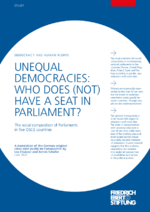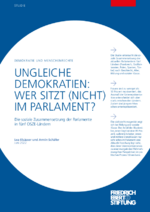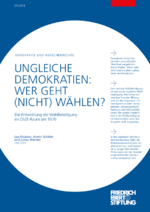Unequal Democracies
Who does (not) have a seat in parliament?
In Who does (not) have a seat in parliament? we look at how representative the current parliaments of United Kingdom, France, Spain, Poland and Turkey are across four socio-economic parameters gender, age, social class and levels of education.
This is a primary data study where information on representatives were single-handedly collected by the project team and verified. For classifying the social classes, we use Daniel Oesch’s class scheme system based on 4 main classes: working class, small business owners, lower-grade service class, and upper service class. Those four main social classes can be further differentiated into 16 classes in total based on to different work logics within social classes.
Elsässer, Lea; Schäfer, Armin
Unequal democracies: who does (not) have a seat in parliament?
Vienna, 2022
Download publication (160 KB, PDF-File)
Key Findings
Women are still underrepresented
Underrepresentation of women is much higher in Poland, Turkey and United Kingdom compared to France and Spain. The only age groups where women are in the majority are aming the under-30s in the United Kingdom and Spain; they are in the minority in all other age groups in all five countries. .
Almost no young people sit in parliaments
Only 1-2% of MPs in all five countries are under 30 years old. In all countries, most MPs are between 46-60. Spain has significantly fewer MPs who are over 60 than the other four countries.
We live in "diploma democracies"
Diploma democracy refers to the overwehlming majoirity of MPs having a university degree and the disappearance of reprsentatives with manual work. This increasing disproportion of highly educated MPs accompaynied leads to an increasing homogeniety widening the representation gap. The dominance of "career politicans" among the upper service class MPs at the expense of other technical expertise and perspectives narrows the diversity in parliaments even further.
Very few workers sit in parliaments
All three lower social classes - small business owners, the lower-grade service and working class - are in significant minority in all parliaments even if combined. This misrepresentation is especially stark for the working class who constitute a much higher share of the (working) populations in these countries.. Working class MPs amount to only 2% in the UK, 1% in Turkey, 4,5% in Spain and France and 7% in Poland. Note that in Poland, France and United Kingdom the majority of working-class MPs belong to the centre or radical right while in Turkey and Spain most working-class MPs are from the left.
More...
Explore the full data set in the slideshow below
German versions
Elsässer, Lea; Schäfer, Armin
Ungleiche Demokratien: wer sitzt (nicht) im Parlament?
Wien, 2022
Download publication (170 KB, PDF-File)
Elsässer, Lea; Schäfer, Armin; Wenker, Jonas
Ungleiche Demokratien: wer geht (nicht) wählen?
Wien, 2022
Download publication (570 KB, PDF-File)




